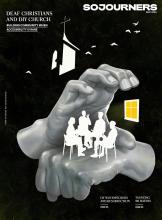I WAS STANDING at a bus stop in northern Virginia this spring with another dad putting his kids on the bus. He is a federal employee coping with the sudden precarity of the career he pursued to support his family. President Donald Trump’s executive order in February that directed federal agencies to submit plans for “large-scale reductions in force” may leave this dad out of work.
President Trump’s deployment of billionaire Elon Musk to dismantle the federal government fulfills a long-held dream for some. Since the mid-1980s, certain far-right Republicans have wanted to enact political strategist Grover Norquist’s mantra: “I don’t want to abolish government. I simply want to reduce it to the size where I can drag it into the bathroom and drown it in the bathtub.”
Well, “government” is “people.” Real people. There are 2.4 million federal employees, not including the military or the postal service. Under the Trump administration, they wake up each day not knowing whether the world’s richest man and the world’s most powerful man will decide that they no longer have a job.
Federal workers are only one sector in Trump’s bull’s eye. This administration is attempting to erase the existence of transgender and other gender-diverse people: A day one executive order proclaims that “it is the policy of the United States to recognize two sexes, male and female. These sexes are not changeable.” Trump has banned trans people from women’s sports and the military and now is attempting to eliminate gender-affirming medical care for people under 19. Immigrants are also facing a terrifying crackdown. Immigration enforcement officials arrested more people in the first 22 days of February this year than in any month for the past seven years, according to The Guardian. Green-card holders have been deported for their political activities. Immigrants accused of gang membership were flown to a maximum-security prison in El Salvador in open defiance of court orders.
Read the Full Article

